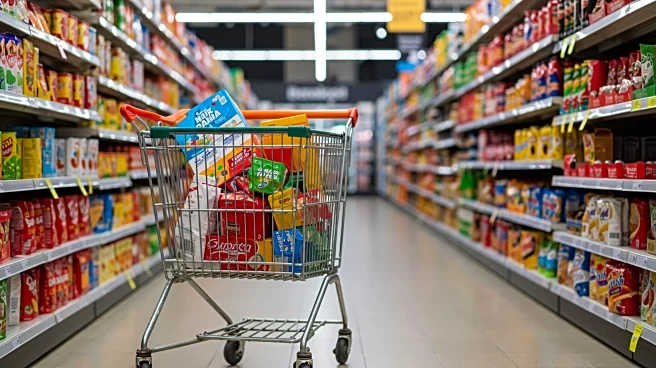What's Happening?
Private label products are becoming increasingly significant in the U.S. retail market, with Trader Joe's and Aldi leading the trend. According to recent data, Trader Joe's and Aldi have the highest reliance on private label products, accounting for 78% and 77% of their overall sales volume, respectively. Other major retailers such as Sam's Club, Costco, Dollar Tree, Walmart, and Kroger also report substantial portions of their sales from private label products, ranging from 25% to 33%. The warehouse club channel has the highest portion of sales as private label products at 34.8%. Fast-growing private brands include Walmart's 'Bettergoods', Target's 'Dealworthy', and CVS's 'Well Market', each increasing sales volume by over 300%. Despite the success of private labels among these retailers, Amazon's private label products account for only 2% of its sales volume.
Why It's Important?
The rise in private label sales reflects a shift in consumer preferences towards cost-effective and exclusive products offered by retailers. This trend is significant for the retail industry as it allows companies to differentiate themselves and increase profit margins by reducing dependency on third-party brands. Retailers like Trader Joe's and Aldi benefit from strong brand loyalty and unique product offerings, which can drive customer retention and attract new shoppers. The success of private labels also poses challenges for established national brands, which may need to innovate or adjust pricing strategies to compete effectively. Additionally, the growth of private labels can impact supply chain dynamics, as retailers may seek to streamline production and distribution processes to support their in-house brands.
What's Next?
Retailers are likely to continue expanding their private label offerings to capitalize on consumer demand. This could involve introducing new product lines, enhancing quality, and leveraging marketing strategies to promote these brands. As private labels gain traction, national brands may respond by increasing promotional efforts or collaborating with retailers to create exclusive products. The competitive landscape in the retail sector may intensify, with companies vying for market share through innovative private label strategies. Furthermore, consumer behavior and economic factors such as inflation could influence the growth trajectory of private labels.
Beyond the Headlines
The expansion of private labels raises questions about consumer choice and market diversity. While private labels offer affordability, they may limit the variety of products available to consumers, potentially reducing competition. Ethical considerations also arise regarding transparency in sourcing and production practices for private label goods. Retailers must balance the benefits of private labels with the need to maintain ethical standards and consumer trust. Long-term, the success of private labels could reshape the retail industry, influencing how products are developed, marketed, and consumed.









